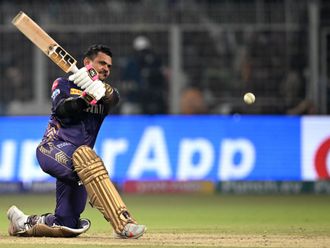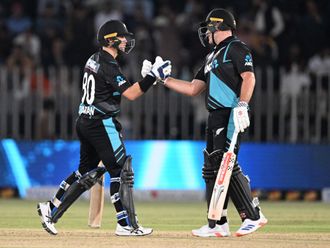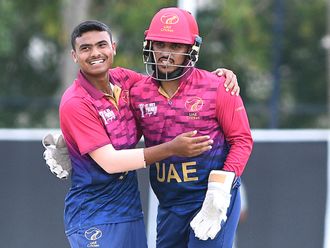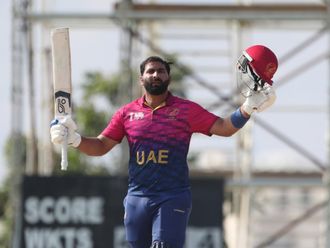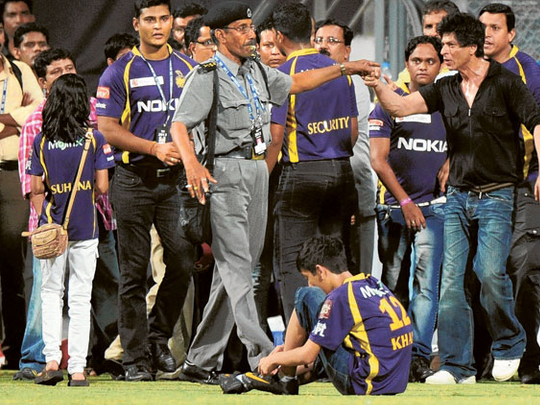
Dubai: The Indian Premier League has plunged into controversies one after another. The hullabaloo surrounding the event has made bigger news than the exciting contests. This can be a dangerous trend and can destroy the fabric of the game, although the event is meant to be more of an entertainment than serious cricket.
Whether for the right or wrong reasons, IPL has caught the headlines. This makes one wonder whether the event itself is designed in such a manner that it can breed controversies and at the same time entertain people. No entertainment can remain as the talking point unless it generates news, and IPL has done it with alarming frequency. It has created heroes and even transformed the architect of the event Lalit Modi into a villain.
Knowingly or unknowingly, the Board of Control for Cricket in India (BCCI) has achieved what it wanted to as the event has become the discussion point above every other major news in India, and particularly in almost all the cricket playing nations.
The event itself is a fairytale because it transformed some very poor cricketers into rich men. It also made the event the most sought-after sport.
Every parent now aims at their children playing the IPL. The scope for a cricketer to become professional has got broadened too. More youngsters are now ready to take cricket as a serious career, since financial returns, if successful, can be enormous. Unfortunately the BCCI has failed to filter the good from the bad as some of their top officials got intoxicated by its success.
Unaccounted money has made its way into the event, and it is also turning out to be a breeding ground for gamblers big and small. Spot fixers now lurk around the stadiums waiting to bait an innocent cricketer, enticing him with huge sums of money to get them to commit the heinous crime.
Team owners who were meant to add glamour to the event, such as Shah Rukh Khan, have acted like spoilt brats abusing and threatening officials while exploiting their power.
The after-match parties, which were meant to bring the rich and famous into the game, have now gone out of control with wrong people hosting parties for players and gaining mileage out of it. These parties have also made way for drugs, spinning it completely out of control.
Inebriated cricketers got carried away, like Royal Challengers' Australian player Luke Pomersbach who even ventured to allegedly molest a woman. Budding cricketers such as Wayne Parnell and Rahul Sharma got lured to the rave parties.
Pertinent questions
All of this raises one pertinent question as to whether the IPL is now a run-away train. Have people forgotten that cricket is a game played within a boundary line, and that the boundary line is meant to safeguard the sanctity of the game? Or, has this been wiped away conveniently?
The lure for money, fame and greed will gnaw away not only the event but also sportsmen. It should not reach a stage where people talk about this event more as the shame of India.
Given that many IPL related parties are held outside the cricket arena, the BCCI should strongly recommend to the franchises that such parties should not be held in the name of the IPL. The truth however is that these parties are meant to be more of a networking and business expansion opportunity for the owners of the different teams, and these will be hard to stop.
So to live in denial that there is nothing wrong with the IPL would be dangerous. A set of rules to streamline all activities related to this event, both on and off the field, is mandatory; unless the BCCI still wants the IPL to keep creating news for the wrong reasons too.
Legendary pacer Wasim Akram has remarked that it is critics jealous of IPL's success who are slamming the event. Before drawing his conclusion, Akram should ask himself if any cricketing event has ever generated so much controversy as the IPL. Hasn't the event given the critics enough ammunition to attack regularly?
Protested
There would never be any takers if people protested against an event which is clean and where cricket is held in high esteem.
Akram is right in noting that only a successful event will have critics; but to remain successful it has to live up to its glamour. It is an event held in a country where tradition and culture play a big role in influencing people's mindsets.
Thousands have been turning up for the matches genuinely believing that what they see is all true and not fixed, and that players are giving their best. This confidence among fans and their love for the game and adoration for the cricketers is what is filling the stands; but once that is lost, then it will be akin to destroying the goose that lays the golden eggs.
It is true that entertainment should come with drama.
Dramas
Enough dramas have been created already. Harbhajan Singh did what no cricketer in the history of Indian cricket ever did when he slapped Shantakumaran Sreesanth in the first season.
That was the biggest talk of the event, and it slowly died down.
In the second season, Lalit Modi took on the government and shifted the event to South Africa. The third season had even more excitement when Modi took on Shashi Tharoor, a minister, and both lost their jobs.
But what took the cake was when the BCCI expelled Modi for alleged acts of individual misdemeanours.
Today Modi lives in exile, which has resemblance to some of India's epic tales. When IPL ceases to create news, he fires a salvo from abroad revealing one of the many misdeeds committed by the organisers.
Though Kochi Tuskers as a team did not create much news on the field, they created enough drama off it. Finally it had a tragic end with the BCCI deciding to terminate the outfit.
The big talk soon after this edition of the IPL commenced was about the dip in the event's TRP ratings. It worried many owners as well as television channels who were milking money out of snippets from the event, till the controversies surfaced one after the other. It came as a timely gift for them.
Top channels ventured to debate for hours over the five uncapped players who were alleged to have agreed to indulge in spot fixing; then came Shah Rukh Khan's brawl at Wankhede stadium, and the Pomersbach molesting incident.
These stories even sidelined India's major econ-omic issues like the falling Indian rupee against the dollar.
The IPL controversies lured viewers and tele-vision channel owners laughed all the way to the bank getting enough scope to air their advertisements amidst these debates.
All of this boils down to one truth that the IPL is a business in the name of sports, and controversies will be part and parcel of the event. The only danger is about deciding where the boundary line that separates fame from shame will be.
IPL should be remembered for creating cricketers of repute rather than destroying promising careers.


